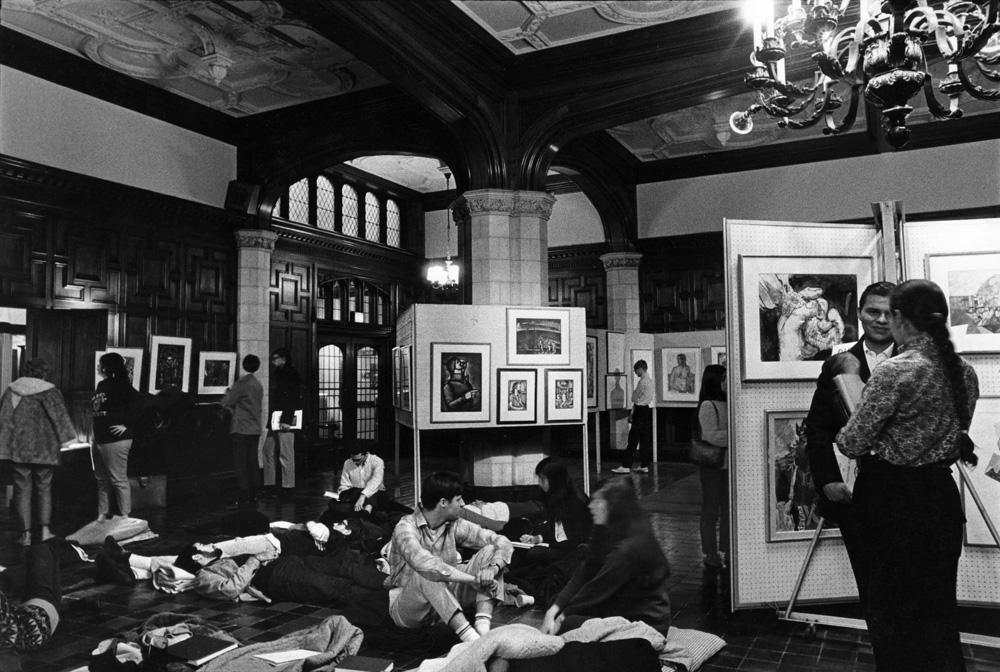
The Department of Cinema and Media Studies (CMS) is recognized among the finest doctoral programs in our field, with a curriculum that focuses on the history, theory, and criticism of film and related media. Faculty are drawn from a wide range of departments and disciplines primarily in the arts and humanities. In addition to offering its own doctoral degree, CMS offers courses and guidance to students who specialize in film and related media within departmental graduate programs or might be pursuing a joint degree.
Centering on the cinema, the graduate program provides students with the critical skills, research methods, and an understanding of the debates that have developed within cinema studies as a discrete discipline. At the same time, the study of cinema and related media mandates an interdisciplinary approach in a number of respects. The aesthetics of film is inextricably linked to the cultural, social, political, and economic configurations within which the cinema emerged and which it in turn has shaped. Likewise, the history of the cinema cannot be separated from its interaction with other media. Just as it is part of a whole new culture of moving images and sounds that includes television, video, and digital technologies, the cinema draws on earlier practices of instantaneous photography and sound recording and, in a wider sense, those media that are more often described as the fine arts (painting, sculpture, architecture, literature, theater, and music). Finally, the interdisciplinary orientation of the program entails an emphasis on the diversity of film and media practices in different national and transnational contexts and periods and thus an understanding of the cinema as a historically variable and rich cultural form.
Students admitted to the PhD program receive full funding for the duration of their program, along with opportunities for supplemental funding both from within the department and the Humanities Division as a whole. Students also gain pedagogical experience as teaching assistants and lecturers to prepare them for life beyond their dissertation.
Academic Community
CMS students are members of a robust and vibrant academic community dedicated to the historical and theoretical study of film. The department is home to 18 core faculty members, a community of resource faculty, post-doctoral fellows, and close to 40 graduate students, each pursuing their studies with the scholarly rigor and interdisciplinary approach that is characteristic of the Chicago intellectual tradition.
Students in the graduate program are advised during their first few years after matriculation by the Director of Graduate Studies (DGS). The DGS helps students navigate the coursework requirements, program expectations, professional and scholarly development, and interdisciplinary connections throughout the Division.
Our students and faculty exchange ideas in courses and seminars, workshops, lecture series, and events run with the Film Studies Center, interacting closely with scholars across the University of Chicago. We have close ties with faculty in students in many departments and centers across campus, including East Asian Languages and Civilizations; Art History; English Literature; South Asian Languages and Civilizations; Slavic Languages and Literature; Theater and Performance Studies; the Gray Center; the Center of Race, Politics, and Culture; the Center for the Study of Gender and Sexuality; and the Karla Scherer Center for American Culture.
Alumni Community
Graduates of CMS are among the leading international experts in their fields. Recent CMS alumni have gained academic positions at prestigious institutions such as the University of Chicago, University of Colorado, Florida-Atlantic University, University of Rochester, Saint Louis University, University of Toronto, SUNY Purchase, UCLA, Queen Mary University: London, and UNC Wilmington among others. Other alumni have taken non-academic positions in universities, archives, the arts, and museums.
